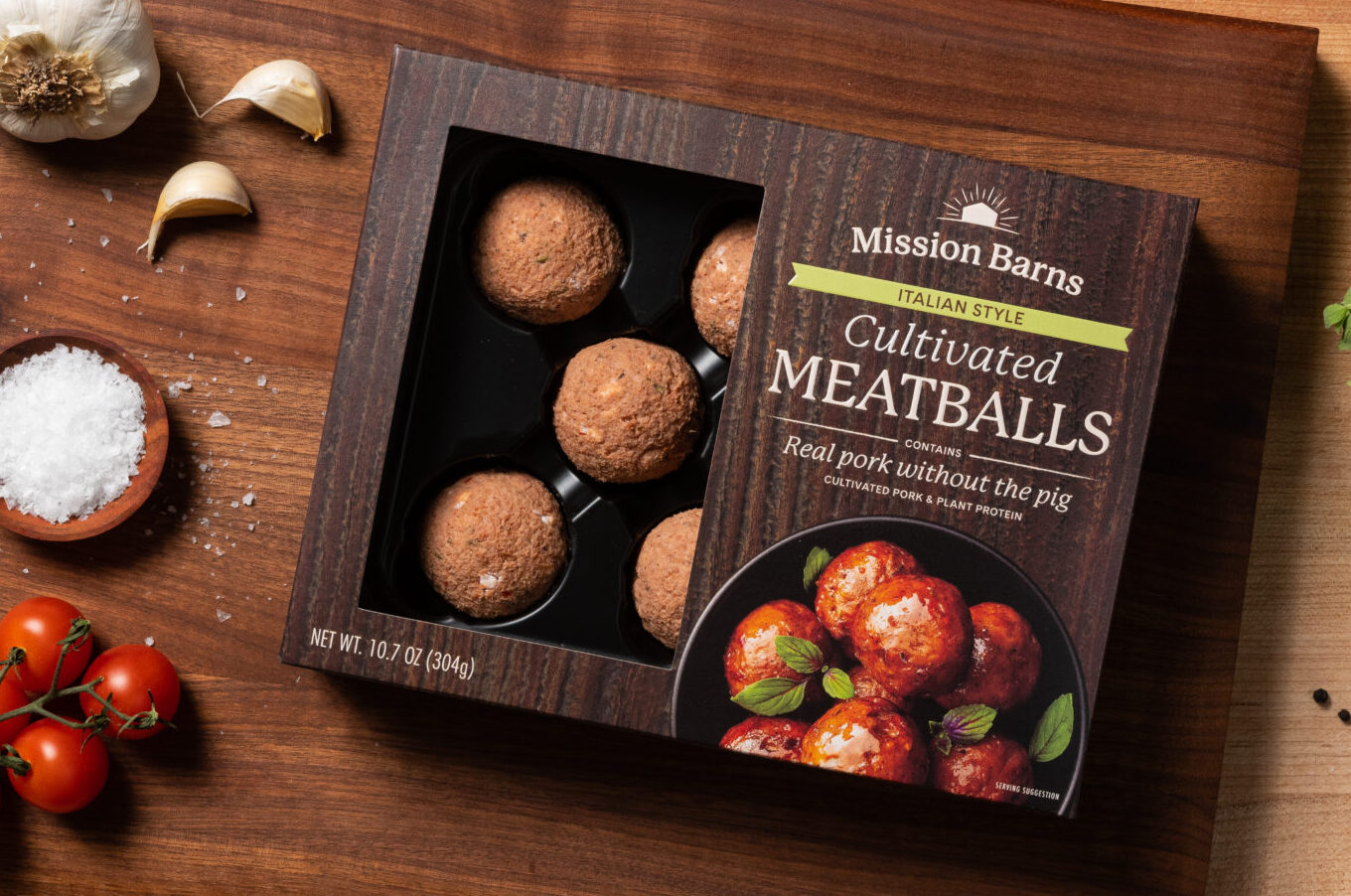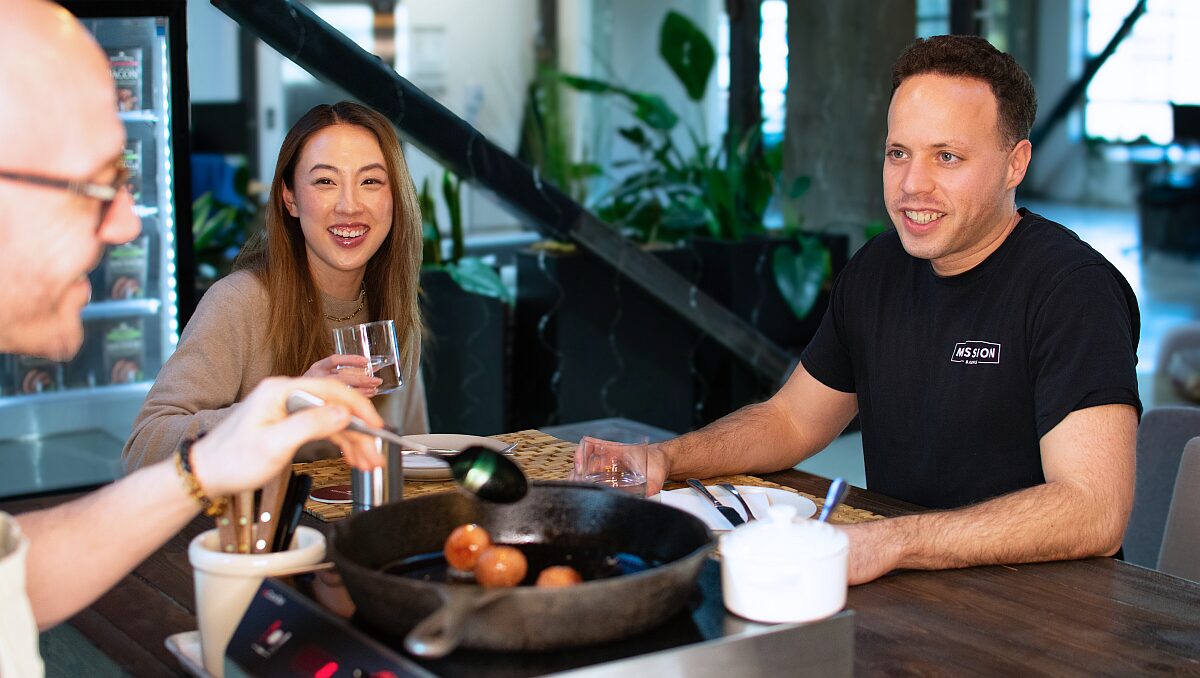
Mission Barns, a startup growing animal fat in proprietary bioreactors it claims can dramatically improve the efficiency of the production process, has cleared the final hurdle required by US regulators, securing a grant of inspection from USDA for its production facility and label sign-off for its cultivated pork fat following FDA approval earlier this year.
The fat will debut in meatballs and bacon at San Francisco-based restaurant group Fiorella and in meatballs at a Sprouts Farmers Market store in the Bay area in Q3, says chief business officer Cecilia Chang. “Our mission has always been to solve the biggest barrier to alternative proteins: taste. Cultivated fat is the key.”
The retail label will say: “Cultivated meatballs. Contains real pork without the pig, cultivated pork & plant protein.”
The products will combine plant-based proteins and small amounts of cultivated pork fat, said the firm, which is the first to receive regulatory clearance for cell-cultivated animal fat, and the fourth to secure full US regulatory approval to sell cultivated animal cells (after UPSIDE Foods, GOOD Meat, and Wild Type) for human consumption.
With US approval in hand, Mission Barns is talking to partners in CPG, ingredients, and meat about launching small-scale trials in multiple settings to assess consumer interest, says the company, which has a pilot facility in the San Francisco Bay area.
For larger-scale production, the plan is to license the firm’s bioreactor tech to third parties rather than seeking to fund a larger facility in-house, Chang tells AgFunderNews.
Given the efficiency of the bioreactor design (outlined in detail here), she said, “Based on our techno economic analysis, we believe that we can be competitive with conventional pork fat at 20,000 liters.”
As for what that means in terms of capex, she says, it depends on whether you’re starting from scratch or installing a bioreactor at an established facility. “We’ve talked to partners and done the modeling, and the cost is much lower for companies that have existing infrastructure, which is why we’re really targeting those players. Let’s expand into an existing facility. Let’s take over a decommissioned facility or underutilized, under capacity facility.”

Is there a market for cultivated fat?
But is there a market for cultivated animal fat? And will alt meat brands want to compromise their plant-based credentials by including animal fat (albeit produced in a bioreactor instead of an animal) in their products, even if it does significantly improve the eating experience?
While some will not, many companies Mission Barns is talking to believe there is potential to create a new generation of products for consumers that are dissatisfied with current plant-based offerings and are not prepared to compromise on taste, claims Chang.
From a commercial perspective, meanwhile, fat grows faster than muscle, can be grown with cheaper inputs, and even a small amount can make a very big difference in the sensory profile of the product, says Chang.
While it’s initial focus in on the US, Mission Barns has filed a regulatory submission in Singapore, and also expects to be able to sell product in Hong Kong, adds Chang. “The fact that our process is Non GMO is attractive to potential partners in Asia and Europe.”

Funding
While funding for many agrifoodtech segments has fallen sharply since early 2022 as generalists have fled the sector, private capital going into cultivated meat has almost dried up. AgFunder data shows that funding peaked at $989 million in 2021, dipped to $807 million in 2022 and then fell precipitously to $177 million in 2023. In 2024, there were just two notable rounds in the cultivated meat space: Mosa Meat’s $43 million raise in April and Ever After Foods’ $10 million raise in June. In 2025, Aleph Farms is the only firm to announce a meaningful round.
Against this backdrop, firms have been slashing headcount, consolidating, and calling it quits (click here and here).
Founded in 2018, Mission Barns has raised over $60 million and is now raising new funds, says Chang. “It’s no secret that the sentiment [around cultivated meat and alt proteins in general] has definitely changed over the last few years and there are a lot more questions around both economic and technical viability.
“But I think what people are excited about is our b2b approach that is a lot more capital-light. And number two, we have a product strategy that enables realistic unit economics. From day one, we’ve also been super pragmatic. We were never trying to make a fully cultivated steak, for example.
“Number three is the regulatory piece. There was a long period where there weren’t [any approvals] and people had questions like, is anyone else [after Upside and Eat Just in 2023] going to get approved? So I do think that’s been really exciting, both our approval and Wildtype’s approval [for cultivated salmon] this year.”
Further reading:
Mission Barns unveils ‘novel, scalable, adherent’ bioreactor for cultivated meat, fat
Clever Carnivore’s pragmatic path to cultivated meat profitability, starting with $0.07/liter media
The post Mission Barns secures USDA green light for cultivated fat, plans Q3 launches appeared first on AgFunderNews.




